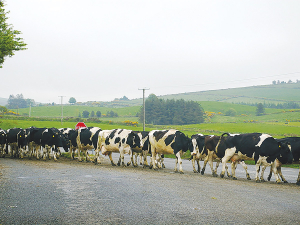DairyNZ opens applications for associate director role
DairyNZ is giving New Zealand farmers a unique opportunity to gain hands-on governance and leadership experience within the dairy sector.
 Farmers must ensure body condition score (BCS) targets will be met as per contract on takeover date.
Farmers must ensure body condition score (BCS) targets will be met as per contract on takeover date.
DairyNZ says all cattle, regardless of their purpose, must be treated with care and respect as they are being prepared for transport and then physically transported.
A comfortable and safe journey for cattle reduces effluent on public roads and ensures animals arrive at their destination fit and healthy.
DairyNZ recommends a checklist for transporting cows - for farmers and transporters. This checklist covers: transport planning, days of transport, checking to see if the animals good to go and how to take care of sick animals.
It says farmers must ensure body condition score (BCS) targets will be met as per contract on takeover date.
"If BCS, pasture cover targets or supplements on hand are not going to be met, have a proactive conversation with the other party as to what arrangement can be made to compensate," it says.
Planning for the movement of cattle must commence in the weeks and months prior to transport.
DairyNZ recommends completing Body Condition Scoring (BCS) of all animals for transport and making plans to ensure all stock will reach target BCS by moving day.
"Do a final check over for any cull cows that have been missed - arrange for removal from farm. Where possible, ensure they will go to the nearest processing plant. If processing plants are full then make a Plan B.
"Dry off as many animals as possible and do this with sufficient time to ensure that they are properly dried off on the day of transport and confirm the exact number of cattle you need to transport.
"Ensure all animals that are going to be transported are NAIT compliant (i.e. have NAIT tags in their ear and are registered with NAIT)."
Day Prior To Transporting
Day of Transporting
Reflecting on the past year, Horticulture New Zealand chief executive Kate Scott says there has been a lot to celebrate.
Ministry for Primary Industries (MPI) Director General Ray Smith is giving a big shout-out to the horticulture sector, especially kiwifruit.
Early forecasts for New Zealand's apples and pears point to a standout season marked by exceptional fruit quality and high pack-out rates.
Tickets are now available for Beef + Lamb New Zealand’s (B+LNZ) Out the Gate, returning from 19-21 May 2026 at Te Pae, Christchurch.
Dairy Women's Network (DWN) is welcoming AgriHealth as a new partner.
Northland Field Days patron Ross Newlove remembers the inaugural field days he attended 40 years ago.